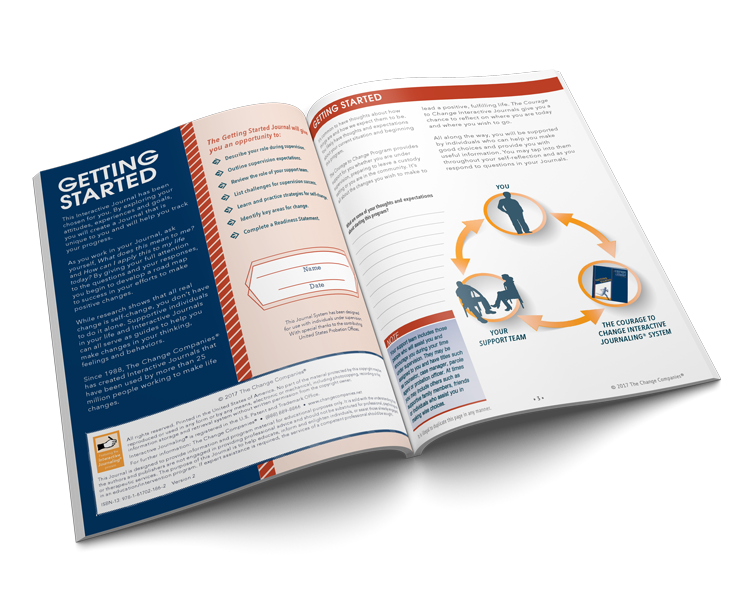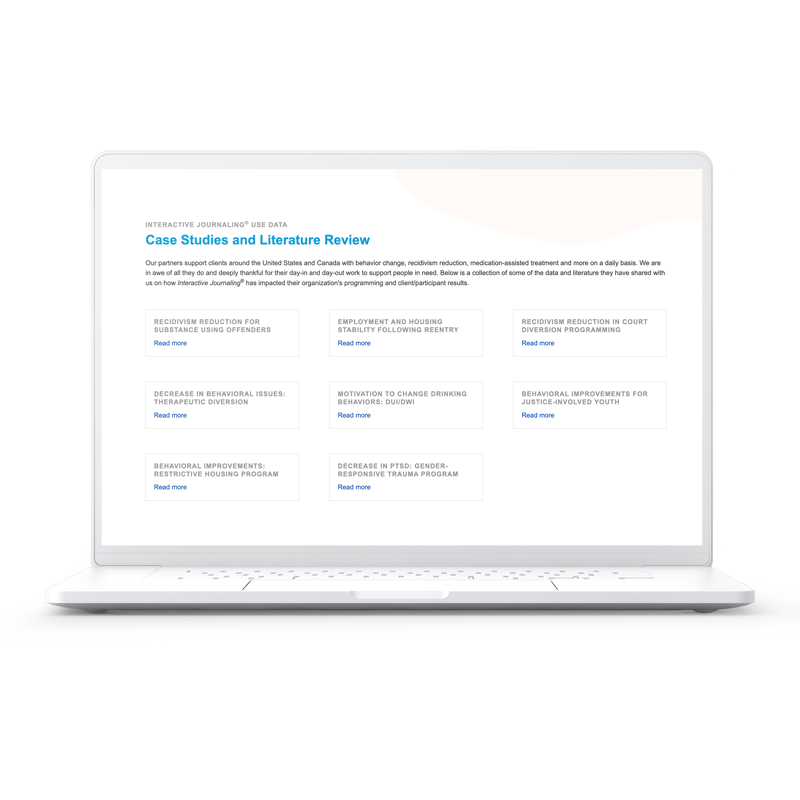
EVIDENCE-BASED SOLUTIONS
Court Services and Diversion Programs
Home / Sector Solutions / Court Services & Diversion Programs
The Change Companies offers curricula and resources specifically developed for treatment court professionals that can be individualized to meet client needs in problem-solving courts, family courts, veterans courts and more. Whether you are a treatment provider, probation officer, case manager, drug court coordinator or judge, The Change Companies' menu of programming options can help you create a wraparound case plan that facilitates recovery and reduces recidivism and relapse risk. Our curricula align with the ASAM criteria to support individualized treatment planning.
At The Change Companies, we put the tools for change directly into the hands of clients and equip staff with tools for person-centered care in one convenient platform. Our core solution for treatment courts includes the Courage to Change case management curriculum, built upon the evidence-based practice of Interactive Journaling®.
In addition to evidence-based curricula, our core solution includes access to the Fidelity Platform and live training for staff to ensure your organization is implementing best practices and gaining relevant skills for effective, person-centered treatment.
QUICK NAVIGATION
This page provides an end-to-end solution for treatment court professionals that includes curriculum, training and additional resources.
| Evidence-based Court Services and Diversion Programs Curriculum | |
| Staff Training and Skill Building | |
| Additional Treatment Court and Diversion Program Resources | |
| Digital Curriculum (Atlas) |
Solution Benefits
NO. 1
Enable Individualized Care: Person-centered approach ensures that participants receive interventions that match their unique circumstances and recovery needs.
NO. 4
Measure and Improve: Measurement and assessment tools enable real-time evaluation of program effectiveness and drive accountability.
NO. 2
Use EBPs: Make evidence-based practices engaging and effective, enhancing participant adherence and boosting court program success.
NO. 5
Align with the ASAM Criteria: Curriculum maps onto the ASAM Criteria dimensions, providing scientifically grounded treatment strategies for maximum recovery outcomes.
NO. 3
Bring Consistency to Court Management: Ensure consistency and fidelity across all court officers and sites, promoting equitable and effective program implementation.
NO. 6
Empower Court Staff: Enhance preparedness and job satisfaction by providing court staff with comprehensive training and support.
“Interactive Journaling® puts the power back in the hands of clients who discover they no longer have to feel stigmatized and victimized. The Change Companies promotes active client participation and collaboration with effective and cost-efficient, affordable client materials.” David Mee-Lee, MD, Chief Editor of The ASAM Criteria, 3rd Edition
“Changing a lifetime of drugs and crime is not an easy job. This program forced me to recognize that it was all up to me. I am responsible for where I am and I’m responsible for who I will become.” Interactive Journaling® participant
“The program and Interactive Journaling is helping clients learn to look at all sides of the situation and to think before they act… They gain the ability to look at themselves and make adjustments. They also learn to look at the rest of the world in a more objective way rather than a judgmental way.” Sheri Evans, Director of Education, Delaware County Community Corrections
THE COURAGE TO CHANGE
Evidence-based Court Services and Diversion Programs Curriculum
View Case Plan Support model →
The Courage to Change curriculum is an evidence-based supervision/case management model. Through the use of this cognitive-behavioral Interactive Journaling® curriculum and interaction with their support team, participants address their individual problem areas based on a criminogenic risk and needs assessment (see how Courage to Change aligns with LSCMI and ORAS). Implementation is flexible and can be customized based on risk, responsivity and programming needs. By personalizing the information presented in the Journals to their own circumstances, participants develop a record of their commitments, progress and a roadmap to success in their efforts to make positive behavior change.
UPSKILL STAFF and ENSURE IMPLEMENTATION FIDELITY
Staff Training and Skill Building
Download the training options guide →
Fidelity Platform
The Change Companies’ Fidelity Platform is an integrated resource center providing a wide range of learning opportunities and resources to enhance the skills and knowledge of treatment court professionals. On-demand trainings, a microlearning library featuring session vignettes, and facilitator resources support continuous learning and improvement that are relevant to job roles and career development.
Live Training
The Change Companies’ two-day facilitator training helps treatment court professionals further develop their skills. Live training focuses on building helpful working relationships with clients, practicing motivational skills, preparing for sessions and using evidence-based case management techniques.
INTERACTIVE JOURNALING®
Case Studies and Research
A study on female participants in a treatment court program indicated that Interactive Journaling® participants:
|
Were less likely to receive disciplinary action during treatment
|
|
|
Were more likely to complete treatment
|
|
|
Experienced a significant decrease in PTSD symptoms
|
CURRICULA FOR SPECIFIC NEEDS
Additional Treatment Court and Diversion Program Resources
Browse curricula in our online store →
Orientation
Changing Course is a self-directed resource to help participants start the process of making positive life changes. Participants reflect on their current choices and consider the connection between alcohol, other drugs and crime. Changing Course is listed as an evidence-based program on CrimeSolutions.gov.
Relapse/Sanction
Getting Back on Track is designed for those times when things haven't gone as planned. If a client is experiencing a setback, this self- directed Journal can help them get back on track and prepare to manage obstacles down the road.
Treatment Team Communication Tool
The Drug Court curriculum serves as a communication tool between the participant and the Drug Court team. Areas of focus include thinking errors, personal warning signs and the role that values play in thinking and behavior. The curriculum also includes opportunities for the participant to chart responsible behaviors and track his or her progress in the program.
Risk-need-responsive case management curriculum
The Courage to Change is an evidence-based supervision/case management model that uses a cognitive-behavioral approach to help participants address individual problem areas based on a criminogenic risk and needs assessment.
Crime-specific diversion
ReThink Now is a brief cognitive behavioral skill-building program designed to address misdemeanors and minor crimes. Suitable referrals for ReThink Now include possession, reckless or irresponsible driving, theft, assault, resisting arrest, family court issues or multiple offenses.
Financial literacy
The Financial Literacy curriculum gives participants the opportunity to explore their money management skills and their beliefs about finances. Topics include checking, saving and investing, credit and loans, insurance, financial pitfalls, budgeting and thriving with money.
Addiction treatment
My Life in Recovery applies the latest research in addiction, mental health and personal change theory for participants in treatment for addiction. The Journals in the My Life in Recovery curriculum can help participants work toward success in treatment and a healthier, happier life. These Journals can be individualized and tailored to the unique needs of each participant.
Assessment tool
The DAPPER-3 is designed to facilitate truly individualized treatment planning by focusing the clinician’s attention on those factors that either require immediate attention or should be considered priorities for the treatment plan.
MOUD/opioid abatement
The Medication Assisted Treatment Journal takes a whole-person approach to treatment and recovery, giving participants the opportunity to not only learn more about medication as a form of treatment, but to gain skills and insights that will help them make positive life changes, set healthy goals and live a full life in recovery.
Intensive outpatient curriculum
Strategies for Change is a cognitive-behavioral treatment program. It addresses substance use issues and provides skill building in the areas of criminal and rational thinking, healthy relationships, prosocial lifestyle and communication.
Veterans Treatment Court
The Change Companies’ veterans’ behavioral health curriculum Coming Home was developed in collaboration with motivational interviewing co-founder Dr. William R. Miller and U.S. veteran Dr. Robert J. Meyers, developer of the Community Reinforcement Approach (CRA/CRAFT). Topics include locating housing, reestablishing important relationships, and emotional and behavioral self-regulation.
DWI Court
The Change Companies’ most widely replicated impaired driving intervention education curriculum, Responsible Decisions, move beyond basic education to application of effective strategies for positive behavior change.
Family Court
The Change Companies’ family resources, My Family and Me and Strengthening My Parenting Skills, help participants develop key family and parenting skills and strengthen family relationships.
Domestic Violence Court
Anger Management is an effective primer for intensive domestic violence intervention programs or a standalone for low- to moderate-intensity interventions. It helps participants explore the role anger plays in their lives and offers strategies and skills for managing how they experience and express anger and other difficult feelings. The SAFE curriculum is a good fit for more intensive domestic violence intervention programs. It provides self-recognition and skill development exercises that explore how past influences, high-risk beliefs and maladaptive thinking led to abusive behavior. These insights help participants develop positive and prosocial skills and lead to the development of a personalized plan for creating healthier relationships.
Tribal and CFR Courts
The Change Companies offers treatment materials for American Indians, Canadian Indigenous groups and Alaska Natives. Tribal treatment curricula were developed in close collaboration with tribal leaders and community members.







